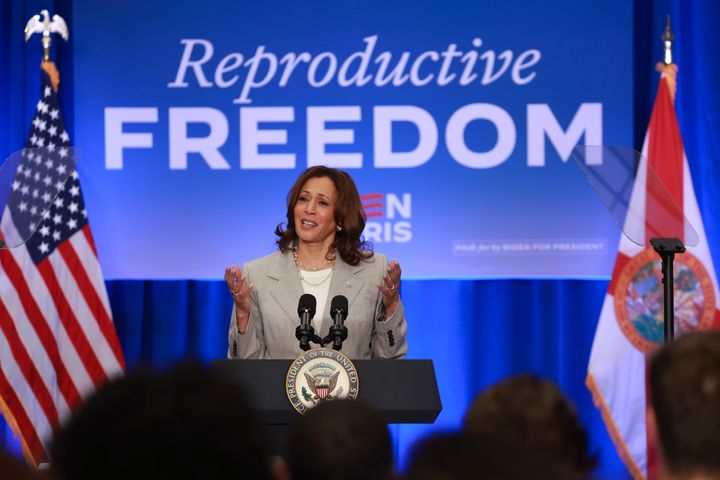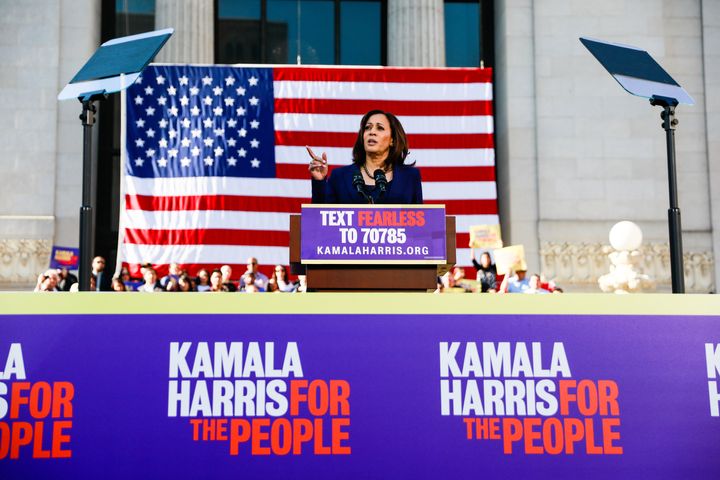Vice President Kamala Harris is the clear front-runner to become the 2024 Democratic presidential nominee, now that President Joe Biden has withdrawn from the race and endorsed her.
That’s true if nobody decides to challenge her. And it’s true if she draws serious competition.
No plausible alternative has her high profile, or access to Democratic strategists, operatives and fundraisers. Nobody else can say they’ve been in the room for key decisions in the last four years, or spent as much time on the world stage. Nobody else would have a running start on the presidential campaign trail, which is a big deal when the convention is four weeks away.
And if Democratic luminaries keep endorsing her, as both Bill and Hillary Clinton did shortly after Biden’s announcement, no other hypothetical contender would have comparable support from the party establishment.
But just how would Harris actually fare against Trump? That’s more difficult to say.
It’s easy to forget now, but Harris carried sky-high expectations into her 2020 presidential bid. She had risen quickly from Bay Area, California, politics to the U.S. Senate, where a series of celebrated committee interrogations of Trump administration officials — and future Supreme Court Justice Brett Kavanaugh— made her a star in the Democratic Party.
But Harris’ presidential campaign fizzled quickly, amid reports of poor management and a widespread sense among political professionals — and, apparently, voters — that she hadn’t really figured out what she wanted to do as president.
Her first years in office as vice president didn’t improve her reputation. She churned through staff and took direct responsibility for parts of immigration policy, at a time migration at the Southern border was becoming a crisis.
Harris’ job approval ratings promptly fell and have remained relatively low ever since. Recent head-to-head surveys, testing how she would do against Trump, showed her only slightly better than Biden.
But it’s not clear how much that polling says about how Harris would fare in November, after reintroducing herself to the public through speeches and (maybe) a debate with Trump — and with the assistance of a full campaign apparatus geared toward maximizing her particular strengths.
She’s got plenty of them, just as surely as she’s got weaknesses. Here’s a quick, non-exhaustive of both:
Some (Under-Appreciated) Political Strengths
1. The most obvious advantage Harris has is her ability to inherit Biden-Harris money and infrastructure, which includes everything from physical offices in the 50 states to workers on the payroll. Her name is on the organization papers; Biden can just turn over the keys.
There are technically ways to transfer the money and organization to the party or an independent political action committee, but coordination with a different nominee’s campaign would be difficult. And that’s to say nothing of the challenge another candidate would face creating their own campaign organization from scratch.
2. Harris has been in the national spotlight for five years now, as a candidate for office and then the sitting vice president. That is five years longer than almost any other plausible Democratic contender.
The experience means she understands the mechanics and rhythm of running a national campaign, which can take even the most gifted natural politicians months to master. The exposure means that media or opposition researchers are unlikely to dig up freshly damaging information.

3. Polls already show Harris doing better with Black voters and young voters, two groups that have been relatively skeptical of Biden in polling.
That makes sense, given that she’d be only the second Black president (and first Black woman). And while her distinctive laugh and mantra about a coconut tree have earned her plenty of grief online, they have also turned her into something of a cult hero with the TikTok crowd.
She also has her very own social media mob, called the KHive, with potential to make Trump supporters as miserable as they once made Harris opponents in the 2020 primaries.
4. Elements of her political profile would make her perfect foils for Trump.
Harris would be a former prosecutor running against a convicted felon, and somebody who went after sex offenders running against a president who a jury recently determined had committed sexual assault.
The latter would probably play especially well among women voters. So would Harris’ long history of advocating for reproductive rights, particularly against the guy whose Supreme Court majority took those rights away.
5. Harris has historically performed best when she’s on the attack, whether in a Senate committee room challenging Trump Attorney General William Barr or in a debate against then-Vice President Mike Pence.
One reason Biden’s weak debate performance against Trump in June set off such alarm bells was that it suggested he couldn’t make his administration’s case powerfully. Harris wouldn’t have that problem.
6. Harris could run on the Biden-Harris record, taking credit for its popular features. And there are a lot of them.
She could say, truthfully, that she was part of the administration that capped insulin prices and gave the federal government power to lower drug prices, and that passed bipartisan gun legislation. All are wildly popular.
She could also tout the Inflation Reduction Act, whose green energy investments are financing a manufacturing boom across the industrial – and electorally vital – Midwest.
Some (Well-Documented) Political Weaknesses
1. Harris would also inherit the unpopular parts of the administration’s record, which means she’d have to answer for the high price of consumer goods, following the period of high inflation that peaked in 2022.
Voters have repeatedly cited those high prices as one of their biggest grievances about life under Biden, and it’s almost certainly a big reason they repeatedly tell pollsters they trust Trump more in the economy. Getting those voters to place that kind of trust in Harris would be a big challenge.
2. The administration’s record on immigration could be an even bigger problem, because Harris already owns part of it.
One of the missions Biden gave to her was addressing root causes of migration from Central America. Republicans have used that to blame her for all of the problems – real and imagined – associated with the border crisis.
Voters have repeatedly told pollsters that they think uncontrolled immigration is one of the biggest problems the country faces, and that they trust Republicans more than Democrats to address it.
Harris was a big target for GOP attacks even when she was just Biden’s vice president. If she becomes the nominee, she’d surely face even more.
3. It’s not clear how much has changed since Harris’ 2020 campaign — which, despite how it might feel, was not that long ago.
The fact that reports of staff problems followed Harris from the campaign trail to the vice presidency is not a great sign about her management abilities, although several accounts from the past year have suggested her office is running more smoothly now.

As for figuring out her political identity — the other widely cited problem from 2020 — that’s harder to judge, because it’s been her job to tout Biden administration policies rather than articulate her own.
4. Bias against women and bias against Black Americans are still facts of political life in the U.S. Harris’ candidacy would be subject to both, especially with Republicans putting the focus on race whenever they can.
Harris is already dealing with her very own birtherism controversy, as well as suggestions that she would be the nation’s first “DEI president,” which is a reference to diversity, equity and inclusion policies.
5. Harris is from California, which means she wouldn’t instantly bring in a boost of Democratic support from a key swing state — in the way that, say, Pennsylvania Gov. Josh Shapiro or Michigan Gov. Gretchen Whitmer could.
And polls show Harris performing slightly worse than Biden when it comes to white voters, whose support can be decisive in the upper Midwest, although Harris could always pick a running mate from one of these states or some other electoral prize.
Disclaimer: The copyright of this article belongs to the original author. Reposting this article is solely for the purpose of information dissemination and does not constitute any investment advice. If there is any infringement, please contact us immediately. We will make corrections or deletions as necessary. Thank you.
